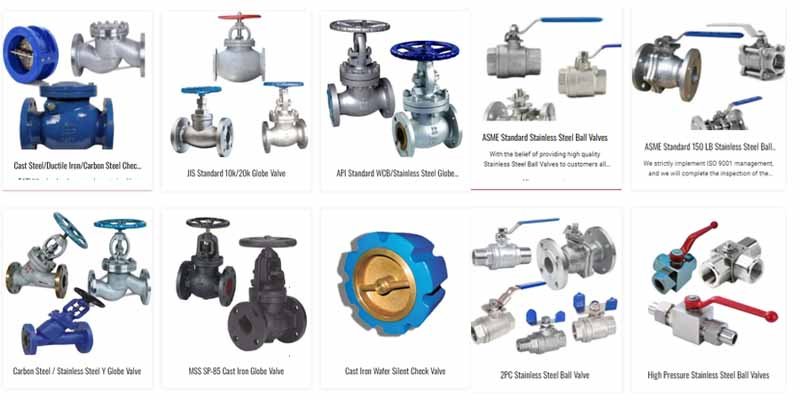Valves are one of the most commonly used materials for controlling liquids, with stopping, regulating and diverting functions, as well as corrosion and water resistance. Common materials for metal valves include steel, stainless steel, cast iron, copper alloy, and titanium alloy.

Steel Valves
Steel is one of the most commonly used materials for metal valves, which is characterized by high strength, good toughness and relatively low price. In some room temperature, pressure is not too high working conditions, the choice of steel valves is more appropriate choice. However, in some high-temperature, high-pressure conditions, steel may be stress corrosion, fatigue and deformation problems, so in these cases need to choose other materials.
Carbon steel Valves:
Suitable for nominal pressure PN ≤ 32.0MPa, temperature -30 ~ 425 ℃ water, steam, air, hydrogen, ammonia, nitrogen and petroleum products and other media. Commonly used grades are WC1, WCB, ZG25 and high-quality steel 20, 25, 30 and low alloy structural steel 16Mn.
Cryogenic Valves:
For nominal pressure PN ≤ 6.4Mpa, temperature ≥ -196 ℃ ethylene, propylene, liquid natural gas, liquid nitrogen and other media. Commonly used grades are ZG1Cr18Ni9, 0Cr18Ni9, 1Cr18Ni9Ti, ZG0Cr18Ni9.
Stainless Steel Valves
Stainless steel is a very suitable material for corrosive media, it is mainly composed of chromium, nickel and other elements, with good wear resistance and strength, not easy to be corroded. Stainless steel valves are the preferred material in the case of seawater, acid and alkali and other corrosive media.
Stainless acid-resistant steel
Suitable for nominal pressure PN ≤ 6.4Mpa, temperature ≤ 200 ℃ nitric acid, acetic acid and other media. Commonly used grades are ZG0Cr18Ni9Ti, ZG0Cr18Ni10 (nitric acid resistant), ZG0Cr18Ni12Mo2Ti, ZG1Cr18Ni12Mo2Ti (acid and urea resistant).
Cast Iron Valves
Cast iron is usually used in the manufacture of valves for low-pressure, low-temperature conditions, and it is a very hard material. Cast iron valves are relatively inexpensive, suitable for some low-pressure, low-temperature occasions, is a cost-effective material
Gray cast iron Valves
Suitable for nominal pressure PN ≤ 1.0MPa, temperature -10 ℃ ~ 200 ℃ of water, steam, air, gas and oil and other media. Commonly used grades are HT200, HT250, HT300, HT350.
Malleable cast iron Valves
For nominal pressure PN ≤ 2.5MPa, temperature -30 ~ 300 ℃ of water, steam, air and oil media. Commonly used grades are KTH300-06, KTH330-08, KTH350-10.
Ductile iron Valves
Suitable for PN ≤ 4.0MPa, temperature -30 ~ 350 ℃ water, steam, air and oil and other media. Commonly used grades are QT400-15, QT450-10, QT500-7.
Acid-resistant high silicon ductile iron Valves
For nominal pressure PN ≤ 0.25MPa, temperature below 120 ℃ corrosive media.
Copper Alloy Valves
Copper alloy is an excellent material for thermal conductivity and has good air permeability and corrosion resistance. Therefore, valves made of copper alloy are suitable for use in some chemical and oil refining industries.
Copper alloy Valves
suitable for PN ≤ 2.5MPa water, seawater, oxygen, air, oil and other media, as well as the temperature -40 ~ 250 ℃ steam medium. Commonly used grades are ZGnSn10Zn2 (tin bronze), H62, Hpb59-1 (brass), QAZ19-2, QA19-4 (aluminum bronze).
High-temperature copper Valves
Suitable for nominal pressure PN ≤ 17.0MPa, temperature ≤ 570 ℃ steam and petroleum products. Commonly used grades are ZGCr5Mo, 1Cr5Mo, ZG20CrMoV, ZG15Gr1Mo1V, 12CrMoV, WC6, WC9 and so on.
Titanium Alloy Valves
Titanium alloy is an excellent corrosion and wear resistant material, and can withstand high temperature and pressure environment, and it also has good oxidation resistance. Therefore, titanium alloy valves are also widely used in some special industries.
Conclusion
Valve shell materials also include chrome molybdenum steel valves, chrome molybdenum vanadium steel valves, duplex steel valves, plastic valves, non-standard customized valves and so on. Valves can be categorized into pneumatic and hydraulic valves and manual valves according to their functions. Valves have fireproof, waterproof, wear-resistant and other characteristics
The choice of metal valves must be selected according to the requirements of the actual working conditions, different materials have different characteristics and scope of application. In the selection of metal valve materials, according to the nature of the medium, temperature, pressure and other factors for comprehensive consideration to ensure the normal operation of the valve, and improve the service life of the valve.
For further information, please contact EATHU, EATHU is committed to providing high quality and cost-effective valves, we provide a variety of materials, certified standard valves, and valves through rigorous testing, in strict compliance with the ISO9001 quality inspection process and standards, we provide you with professional technical support and perfect after-sales service, ready to answer your questions and provide customized solutions!





